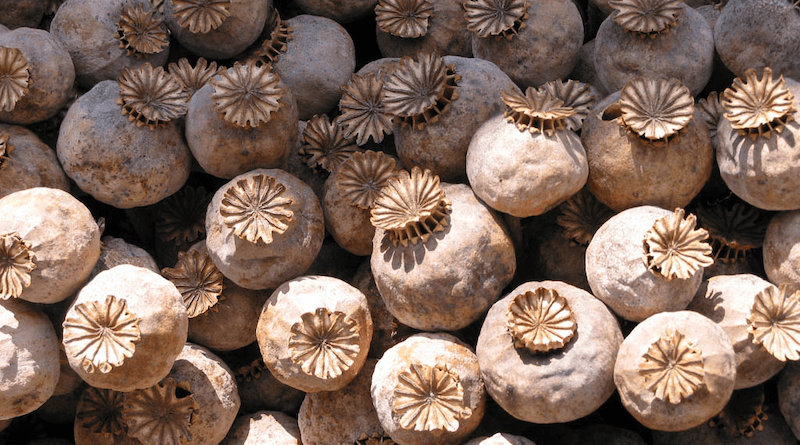UN Says Myanmar Now World’s Top Opium Cultivator
By RFA
An uptick in cultivation brought on by junta mismanagement of the economy has made Myanmar the world’s largest source of opium, according to the United Nations, which warned that the trend is expected to accelerate amid conflict in the country’s remote border regions.
Data collected by the United Nations Office on Drugs and Crime, or UNODC, showed a 18% year-on-year increase in cultivation from 40,100 hectares (99,100 acres) to 47,100 hectares (116,400 acres) in the second full growing season since the military’s Feb. 1, 2021 coup d’etat. This year marked the third consecutive increase in cultivation since the takeover.
The increase has pushed Myanmar’s potential yield to 1,080 metric tons (2.38 million pounds), which the UNDOC said in a report released Tuesday is its highest since 2001 and catapults the country into the top spot among the world’s producers. Opium can be used to make heroin.
As the Taliban – Afghanistan’s de facto authority – reimposed a strict ban on poppy cultivation and opium production in 2022, the country’s production decreased by 95 percent, and Myanmar has become a major cultivation and production hub of opium, according to the statement of UNODC.
“The economic, security and governance disruptions that followed the military takeover of February 2021 continue to drive farmers in remote areas towards opium to make a living,” UNODC Regional Representative Jeremy Douglas said in the report, entitled “Southeast Asia Opium Survey 2023: Cultivation, Production and Implications.”
“The intensification of conflict in Shan and other border areas is expected to accelerate this trend,” Douglas said.
On Oct. 27, the “Three Brotherhood” Alliance of the Myanmar National Democratic Alliance Army, the Arakan Army and the Ta’ang National Liberation Army launched “Operation 1027,” named for the starting date of the campaign, in Shan state. Rebels say they have made notable gains against the military in several key cities and claim to have captured more than 170 military outposts since the start of the campaign.
The Karenni Army, Karenni National Defense Force, and anti-junta People’s Defense Force paramilitaries initiated the second major offensive by ethnic armies against the military – “Operation 1111” – along the shared border between northern Myanmar’s Shan and Kayah states on Nov. 11.
Conflict spurs cultivation growth
The UNODC said the data for its report was based on a survey of 370 poppy farm plots in Shan, Kachin, Chin and Kayah states and showed the most significant annual increase in cultivation in Shan with a 20% uptick, followed by Chin and Kachin, which increased by 10% and 6%, respectively.
Overall, cultivation increased from around 40,000 hectares (99,000 acres) last year to 47,000 hectares (116,000 acres) in 2023.
Opium yield also increased by 16% to nearly 23 kilograms per hectare (20 pounds per acre), beating the country’s previous record a year earlier, which the report said highlighted “more sophisticated farming practices and investments in irrigation systems and fertilizers.”
Meanwhile, the average price paid to farmers per kilogram (2.2 pounds) grew by 27% to U.S.$355, despite an expanding supply, suggesting that opium had become more attractive as a crop and commodity amid strong demand for the drug in Southeast Asia, UNODC said. Farmers earned around 75% more than they did in 2022.
The U.N. said that the growth in opium cultivation is part of “a growing illicit economy” in the Mekong region that includes drug trafficking, money laundering and online criminal activities, generating healthy profits for organized crime rings. Myanmar, and in particular Shan state, is also a leading source of methamphetamine in Southeast Asia.
“The crime and governance challenges in the region are compounded by the crisis in Myanmar,” Douglas said. “Southeast Asia needs to come together to find solutions to both traditional and emerging threats.”
‘We need to accept reality’
A resident of Yangon named Jewel told RFA Burmese that the erosion of rule of law under the junta means that people can now buy whatever drugs they want in Myanmar’s largest city, including opium, without any difficulty.
“At the bars and clubs, narcotics can be consumed openly at one’s table,” she said. “In the past, authorities confiscated narcotics at these places but, at present, no one is arrested. Trade of these drugs is allowed for easy consumption.”
Ying Leng Ham, the spokesperson of the Shan Human Rights Foundation, said that production and transportation of commodities in Myanmar have been severely disrupted by armed conflict that erupted in the wake of the coup.
“In these circumstances, the people have no choice because they can’t make a living from local products such as tea leaves and avocados,” he said. “With no other option, they have turned to poppy cultivation.”
Tin Maung Thein, the chairman of the Myanmar Anti-Narcotics Association in Shan’s Kyaukme township, warned that the trend in his state and for the country in general is likely to continue under junta rule.
“International experts use technical methodology to collect data on narcotic drug production and consumption which is beyond our capacity,” he acknowledged. “However, we have seen significant growth in cultivation in our state, so their figures aren’t surprising. We need to accept reality.”
The UNODC cautioned that any effort to curb cultivation of opium in Myanmar and elsewhere in the region must take into account what it called “the complex realities and vulnerabilities” faced by people living in opium-cultivating areas.
“In the current situation, farming communities are caught between insecurity and economic hardships,” said Benedikt Hofmann, UNODC’s deputy regional representative. “Even more people will look at opium as a viable crop if there are no alternatives, especially in the absence of the rule of law.”

